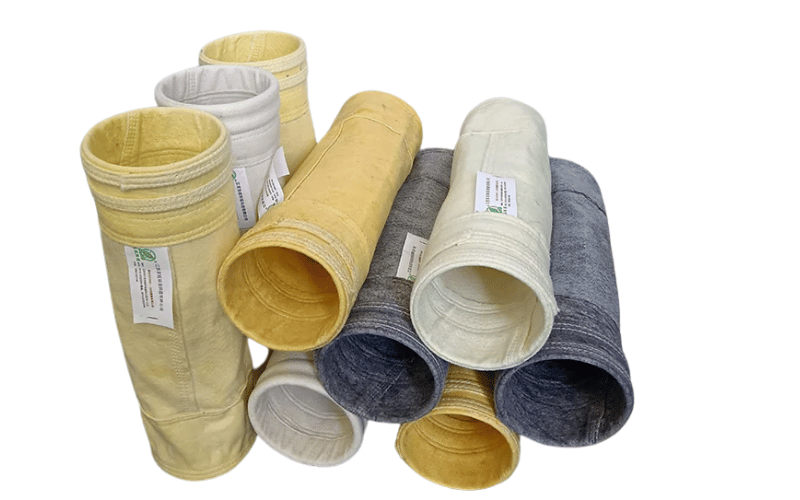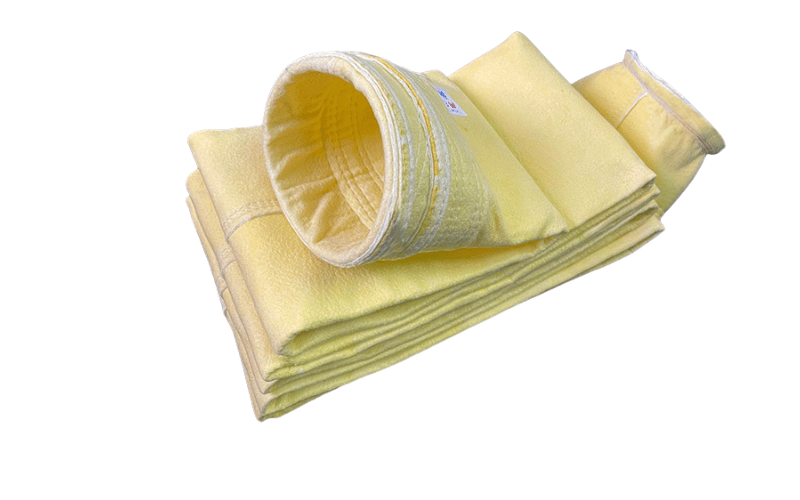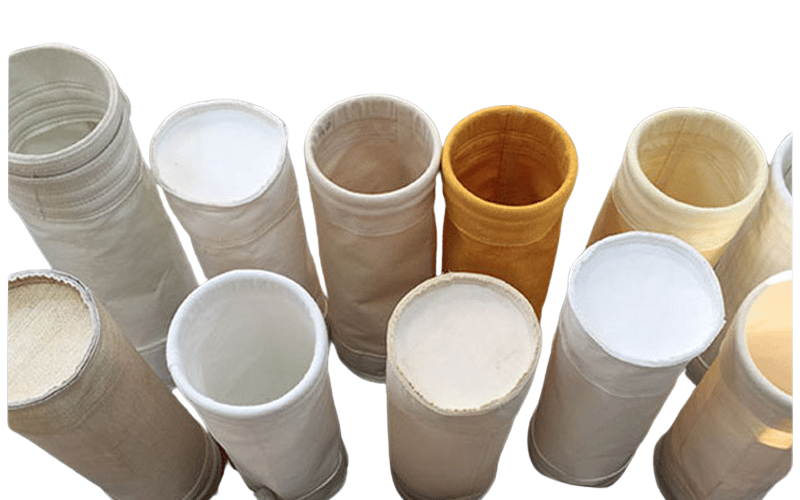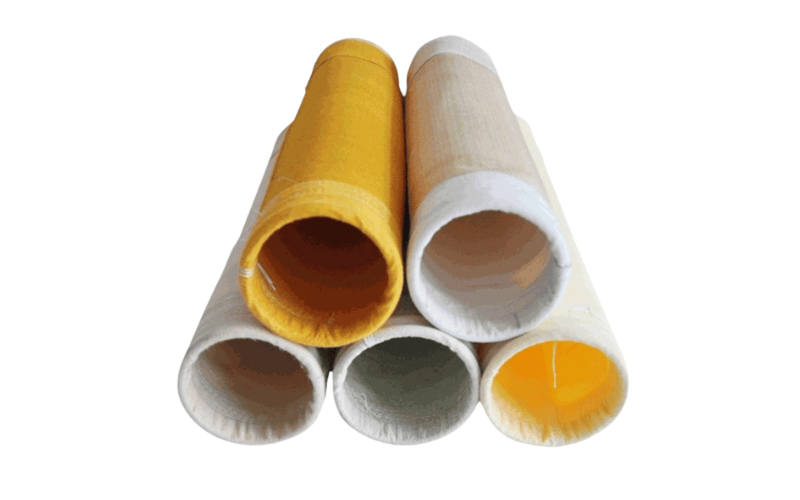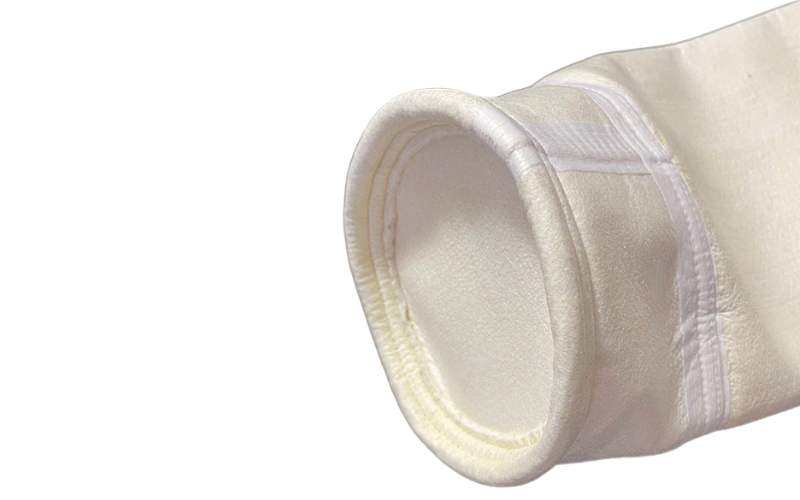Fiberglass Filter Bags
Home » Dust Filter Bag » Fiberglass Filter Bag
Efficient Filtration | Long Service Life | Customizable Options
Fiberglass Filter Bags are crafted from specially woven, surface-treated fiberglass fabric, making them highly effective in environments with varying temperatures and high humidity. Engineered for durability, these filter bags are available in various specifications and are widely utilized across industrial dust removal, environmental purification, and valuable dust recovery applications.
Their versatility and performance make them an essential solution for numerous industrial processes.
Key Applications
Cement Industry
- Dust collection for kiln tail exhaust and clinker cooling devices
- Raw material and coal drying exhaust systems
- Dust collection for raw material and clinker crushing
- Grinding processes for raw materials and coal
- Dust removal in transportation systems, silos, and loading machines
Steel Industry
- Exhaust gas capture and dust removal from electric, open-hearth, and blast furnaces
Non-Ferrous Metallurgy
- Dust and exhaust gas collection from sintering and roasting furnaces
Reliable and adaptable, Fiberglass Filter Bags effectively address complex filtration needs in various industries, ensuring efficiency and operational compliance.
Technical Specifications
| Product Name | Fiberglass Filter Bags | ||
|---|---|---|---|
| Material | Polyester fiber/glass fiber base cloth | ||
| Weight (g/㎡) | 850 | ||
| Thickness (mm) | 1.3 | ||
| Air permeability (㎥/㎡/min) | 14 | ||
| Tensile strength (N/5x20cm) | Vertical | ≧2500 | |
| Horizontal | ≧2000 | ||
| Elongation (%) | Vertical | ≤15% | |
| Horizontal | ≤10% | ||
| Temperature (°C) | Continuous temperature | ≤260 | |
| Instantaneous temperature | 300 | ||
| Post-treatment | Pressed, singed, PTFE coated | ||
| Filter air velocity (m/min.) | <0.8 | ||
| Emission concentration (mg/m³) | <30 | ||
| Characteristics | High temperature resistance, high strength, corrosion resistance | ||
Why Choose Fiberglass Filter Bags (Alkali-Free)?
Fiberglass Filter Bags (Alkali-Free) are advanced dust collection solutions designed explicitly without alkaline substances. Traditional filter fabrics often incorporate alkaline resins to boost performance, but can pose risks to human health and the environment. Alkali-free fiberglass filter bags address these concerns while delivering superior performance.
Key Features
Environmentally Friendly and Safe
These filter bags are non-toxic, free of alkali substances, and do not harm the environment or human health. Unlike traditional fabrics, which utilize alkaline additives for strength and abrasion resistance but contribute to pollution, alkali-free filter bags offer a clean and sustainable alternative.
High-Temperature Resistance
Alkali-free fiberglass filter bags excel in high-temperature environments, maintaining stability and performance under extreme conditions. Traditional fabrics may melt, deform, or degrade when exposed to heat, whereas alkali-free options offer consistent and reliable filtration in demanding applications.
Superior Abrasion Resistance
Engineered for durability, alkali-free filter bags resist wear and friction, ensuring long-term filtration efficiency. Traditional fabrics containing alkaline components often degrade more quickly under abrasive conditions, thereby reducing their lifespan.
Effective Filtration Performance
With high filtration efficiency, alkali-free fiberglass filter bags effectively capture dust particles and contaminants. This improves air quality, reduces environmental impact, and provides cleaner industrial operations compared to traditional alternatives.
Alkali-free fiberglass filter bags are an environmentally responsible choice for industries seeking safe, efficient, and sustainable filtration solutions.
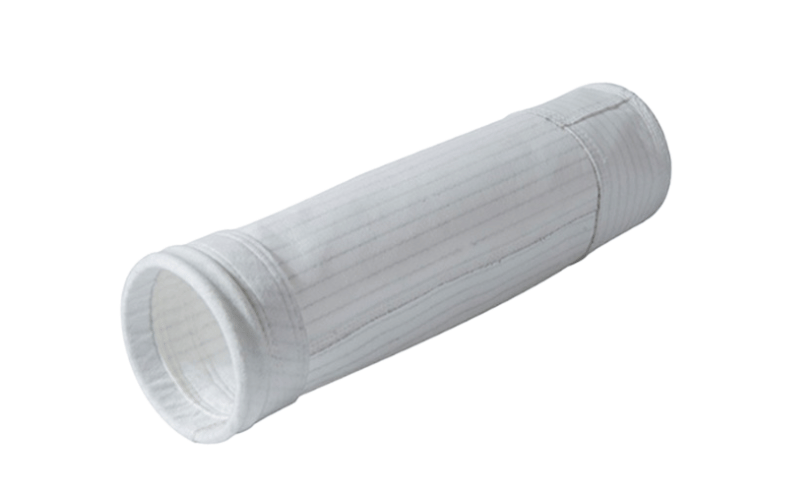
What is a Fiberglass Filter Bag?
Fiberglass filter bags are a highly effective solution for industrial filtration needs, recognized for their durability, versatility, and exceptional filtration performance. We design our fiberglass filter bags using specially woven and treated fiberglass fabric, engineered to meet the rigorous demands of industries such as cement, steel, and non-ferrous metallurgy. These filter bags excel in high-temperature and high-humidity environments, making them a reliable choice for dust collection, environmental purification, and the recovery of valuable particulates. With a wide range of applications, our fiberglass filter bags deliver consistent performance and reliability, ensuring compliance with industrial standards while optimizing operational efficiency.
Understanding the Composition of Fiberglass Fabric
The fiberglass fabric used in our filter bags is the result of meticulous engineering and advanced manufacturing techniques. This fabric is composed of fine fibers made from molten glass, which are spun into threads and woven into a sturdy, mesh-like material. To enhance its properties, we perform surface treatments that provide additional strength, reduce fraying, and optimize filtration performance.
Key attributes of fiberglass fabric include:
- High Temperature Resistance: The material retains its structural integrity and filtration efficiency in environments with continuous temperatures up to 260°C (500°F) and instantaneous temperatures as high as 300°C.
- Corrosion Resistance: The non-reactive nature of fiberglass fabric makes it resistant to chemical exposure, including acids and alkalis, which are commonly found in various industrial processes.
- Dimensional Stability: Fiberglass fabric maintains its shape and does not shrink or deform under extreme operating conditions, ensuring reliable and consistent performance.
- Customization Options: Depending on specific needs, the fabric can be modified with additional treatments, such as PTFE coatings, to improve chemical resistance, abrasion resistance, or ease of cleaning.
We use this reinforced material to construct filter bags in various specifications, ensuring they meet the exacting requirements of a diverse range of industrial applications.
How Does Filtration Work with a Filter Bag?
The filtration process in fiberglass filter bags involves several critical steps that ensure the efficient capture of dust and particulates while allowing clean air or gases to pass through. Here’s how our filter bags work:
Particle Capture: When particulates enter the filtration system, the bag’s surface layer traps them on the exterior while permitting clean air or gas to flow through the porous material. This mechanism ensures effective separation of contaminants from the air stream.
Depth Filtration: The multi-layered construction of the fiberglass fabric allows for depth filtration, capturing finer particles within the layers. This capability contributes to high filtration efficiency and a long operational life for the filter bag.
Backflushing or Cleaning: After a period of use, the accumulated dust on the filter bag’s surface is removed by cleaning mechanisms, such as pulse jet systems. Our filter bags are designed to retain their strength and structure during repeated cleaning cycles, maintaining their performance over extended periods.
This proven filtration process ensures our fiberglass filter bags effectively handle industrial dust collection needs and other challenging filtration applications.
What Makes Fiberglass Filter Bags Unique?
Fiberglass filter bags stand out due to their robust capabilities, tailored specifically to meet the challenges of demanding industrial environments. Here are the unique features that set our filter bags apart:
Exceptional Durability: Constructed from high-grade fiberglass fabric, our filter bags resist wear and tear, even in abrasive or corrosive environments. This durability translates to longer service life and reduced replacement costs.
High-Temperature Performance: The inherent heat resistance of fiberglass enables our filter bags to perform reliably in applications involving kiln exhaust, furnace gases, and other high-temperature processes. This makes them an ideal choice for industries requiring filtration under extreme thermal conditions.
Chemical Resistance: Our fiberglass filter bags maintain their integrity and filtration efficiency when exposed to aggressive chemicals, including acidic or alkaline particulates, ensuring reliable operation in environments such as chemical processing and metallurgy.
Customizability: We offer tailored solutions to ensure compatibility with specific industrial requirements. This includes custom sizes, specialized coatings, and unique designs to optimize filtration efficiency and meet operational needs.
Fiberglass filter bags represent a fusion of advanced material science and superior craftsmanship. Their ability to deliver consistent, high-performance filtration across various industrial applications makes them an indispensable component in maintaining compliance, protecting equipment, and enhancing environmental quality. With our expertise and commitment to excellence, we ensure that our customers receive products that exceed expectations and support long-term operational success.
How Do Fiberglass Filter Bags Perform in Industrial Applications?
Fiberglass filter bags play a crucial role in industrial filtration, providing exceptional performance in demanding environments. They are designed to withstand high temperatures, heavy particulate loads, and chemically aggressive conditions, making them indispensable for industries such as power generation and cement production. Below, we detail their applications and key benefits within industrial settings.
Applications in Power Plants and Cement Kilns
We design our fiberglass filter bags specifically for heavy-duty operations such as those found in power plants and cement kilns. These environments require filter media that can resist extreme temperatures and abrasive particles. Fiberglass filter bags excel in these applications due to their heat resistance, which allows them to handle continuous temperatures of up to 500°F (260°C) or higher, even with associated finishes or coatings.
In power plants, our filter bags are practical in processes such as coal-fired boilers and flue gas desulfurization. Their durability ensures stable long-term operation despite the challenging conditions. Cement kilns, known for their intense heat and dust generation, also benefit from fiberglass bags. They maintain structural integrity while capturing fine particulates, contributing to cleaner emissions and compliance with air quality regulations.
Impact on Air Filtration Processes
Effective air filtration is essential for meeting stringent industrial and environmental standards. We design our fiberglass filter bags to deliver superior filtration performance, capturing fine particulates that other filter media may struggle to handle. The efficiency of these bags ensures a higher level of dust collection, reducing emissions and enhancing overall air quality.
While fiberglass filter bags are highly effective, they also offer relatively low-pressure drops due to their permeability. This characteristic minimizes energy consumption, a significant advantage for facilities seeking to optimize operational costs while maintaining regulatory compliance.
Managing Differential Pressure in Baghouse Systems
Maintaining appropriate differential pressure in baghouse systems is a critical factor in ensuring efficient and reliable operation. Fiberglass filter bags contribute to stable performance by effectively managing pressure differentials. Their permeability allows for smooth airflow, even in systems processing high particulate loads.
When differential pressure increases beyond an acceptable range, it can strain fans, escalate energy costs, and reduce system efficiency. Our fiberglass filter bags, coated or treated for enhanced performance, help prevent excessive pressure build-up by allowing consistent air passage while capturing particulates. Additionally, their chemical resistance ensures they remain robust under exposure to corrosive gases, providing a longer lifespan compared to other media in similar conditions.
By addressing these essential aspects, our fiberglass filter bags deliver reliable, high-performance filtration in a broad range of industrial applications. For further guidance or help in selecting the right solution for your specific needs, don’t hesitate to get in touch with our team. We’re here to help you achieve optimal filtration performance while meeting your industrial demands.
How to Choose the Right Fiberglass Filter Bag for Your Needs?
Selecting the appropriate fiberglass filter bag is essential to achieving optimal performance in industrial filtration systems. With various options available, understanding the key factors and features can streamline the decision-making process. Below, we’ve outlined critical considerations to help you make the best choice for your specific requirements.
Factors to Consider: Operating Temperature and Filtration Needs
Our fiberglass filter bags are designed to withstand extreme conditions, but it’s vital to match the bag’s specifications to your system’s operating environment. One primary factor to evaluate is the operating temperature. Fiberglass filter bags are engineered to withstand prolonged temperatures of up to 500°F (260°C) and, with specialized finishes or coatings, can resist even higher spikes. If your process involves continuous exposure to high heat, choosing a bag with the correct temperature tolerance is critical.
Filtration efficiency is another key element. Our fiberglass filter bags deliver excellent performance in industries with high particulate loads, including power generation and cement manufacturing. However, you’ll need to identify the particle size and type prevalent in your system to ensure the bag’s filtration rating aligns with your system’s needs. This ensures effective collection of dust and particulates while maintaining regulatory compliance.
Comparing Fiberglass Pocket Filters vs. Standard Filter Bags
Fiberglass filter bags come in various designs, including pocket filters and standard filter bags. Each has distinct advantages depending on the application’s demands.
Fiberglass pocket filters are often used where compact design and enhanced pleating provide a larger filtration surface area. They work well in settings where maximizing airflow while reducing pressure drop is a priority. The increased area also extends the time between cleaning cycles, offering consistent operation.
Standard fiberglass filter bags are the preferred choice for heavy-duty applications requiring high durability and resistance to abrasion. These bags are excellent in systems like cement kilns or baghouses where the filtration surface must withstand robust conditions, including heavy dust deposition and high wear.
When selecting between the two, consider factors such as the available space in your filtration system, airflow requirements, and the characteristics of the particulate matter. Our team can help guide you in identifying the best configuration for achieving superior baghouse performance.
Evaluating PTFE Membrane Options for Enhanced Performance
For applications requiring an extra layer of filtration capability, we recommend considering fiberglass filter bags with PTFE membranes. These membranes provide several benefits, particularly in highly demanding or precision-based industries. By incorporating a microporous PTFE layer, these bags significantly improve filtration efficiency, capturing even the finest particulates that standard fiberglass surfaces may miss.
Additionally, PTFE membranes enhance chemical and moisture resistance, making them ideal for environments with acidic or wet gases. This feature not only extends the durability of the filter bag but also helps maintain steady performance over time, even under harsh operating conditions. However, it’s essential to weigh these benefits against your system requirements, as PTFE-enhanced bags typically come with a higher initial investment.
We offer a range of PTFE membrane options that cater to industries seeking top-tier filtration performance. For help assessing whether this option fits your application, our experts are on hand to provide guidance based on your specific parameters.
Choosing the right fiberglass filter bag is crucial for maintaining an efficient, compliant, and cost-effective operation. By taking the time to understand your system’s temperature, particulate, and airflow requirements, along with evaluating advanced options such as PTFE membranes, you can select a solution tailored to your specific needs. If you require personalized recommendations or additional technical support, please don’t hesitate to reach out—we’re here to help.
What Maintenance is Required for Fiberglass Filter Bags?
Proper maintenance of fiberglass filter bags is essential for ensuring their longevity and consistent performance in industrial filtration systems. By following recommended practices and conducting routine checks, you can minimize downtime, enhance efficiency, and prevent costly replacements. Below, we provide a detailed guide on maintaining fiberglass filter bags effectively.
Best Practices for Extending Bag Life
We design our fiberglass filter bags to deliver exceptional durability, but adopting the proper maintenance practices can further extend their lifespan. Here are some key strategies:
- Regular Cleaning: Schedule routine cleaning cycles to prevent dust accumulation. Overloaded filter bags are more prone to damage and reduced filtration efficiency. Automated cleaning systems, like reverse air or pulse jet cleaning, can optimize this process.
- Monitor Operating Conditions: Ensure your system operates within the specified temperature, humidity, and chemical exposure limits. Fiberglass bags can withstand high heat, but exceeding these limits can cause the material to degrade over time.
- Use Appropriate Coatings and Finishes: We offer optional finishes such as PTFE or silicone coatings that enhance resistance to chemicals, abrasion, and moisture. Opting for these treatments can help mitigate common causes of wear.
- Inspect Seals and Cages: Maintain the integrity of the bag-to-cage connection and sealing mechanisms. Any gaps or misalignments can lead to improper airflow and increased particulate bypass, accelerating bag wear.
By adhering to these best practices, you can maximize the operational effectiveness and longevity of your fiberglass filter bags.
When to Replace Your Filter Bag?
While fiberglass filter bags are built for long-term use, every filtration system will eventually require replacements. Knowing when to replace your filter bag is crucial for maintaining optimal system performance. Here are the key indicators:
- Declining Filtration Efficiency: If you notice a significant increase in emissions or particulate matter escaping, it may signal that the filter surface has reached its end of life.
- Frequent Cleaning Cycles: An increase in cleaning frequency could indicate clogging or reduced permeability, suggesting the bag is no longer effectively capturing particulates.
- Compromised Bag Integrity: Signs of physical damage, such as holes, tears, or weakened seams, require immediate replacement to avoid system issues.
We recommend documenting your system’s performance metrics and establishing a preventive replacement schedule based on your specific operating conditions and bag usage patterns.
Signs of Wear and Tear: What to Look For
Conducting routine inspections is crucial for identifying early signs of wear and tear in fiberglass filter bags. Here’s what to watch for during evaluations:
- Surface Damage: Look for thinning or fraying on the exterior layer of the bag. Abrasion from particulates can erode the surface over time, reducing the bag’s ability to retain dust.
- Chemical Deterioration: If your system processes gases with high chemical content, inspect for signs of corrosion or discoloration. This can indicate material degradation due to prolonged chemical exposure.
- Deformation: Check for warping or deformation in the bag shape, which could signal excessive heat exposure beyond the specified temperature tolerance.
- Residual Build-Up: Excessive dust cake that doesn’t clear during cleaning may indicate reduced permeability or a material issue that requires closer analysis.
Addressing these issues promptly can prevent further system damage and maintain the optimal performance of your filtration system.
Taking a proactive approach to fiberglass filter bag maintenance not only safeguards your investment but also ensures reliable and efficient operation. For tailored recommendations, technical support, or help with selecting the right replacement bags, don’t hesitate to get in touch with our team—we’re here to assist you at every step.
FAQ: fiberglass filter bag
Q: What is a fiberglass filter bag and what are its primary uses?
A: A fiberglass filter bag is a high-temperature filter made from woven fiberglass fabric, designed for high filtration in commercial and industrial applications. These filter bags are widely used in environments that require the capture of particulate matter at elevated temperatures.
Q: What is the maximum continuous operating temperature for fiberglass filter bags?
A: Fiberglass filter bags can typically withstand a continuous operating temperature of up to 500°F (260°C), making them suitable for high-temperature applications.
Q: How does the fiber used in fiberglass filter bags contribute to their performance?
A: The fiber used in fiberglass filter bags, specifically woven fiberglass, provides high tensile strength and enhanced flex life and chemical resistance, which are crucial for maintaining performance in challenging environments.
Q: Can fiberglass filter bags be used with pulse jet or reverse air systems?
A: Yes, fiberglass filter bags are compatible with both pulse jet and reverse air systems, allowing for effective cleaning and maintenance while ensuring optimal airflow and filtration efficiency.
Q: What advantages do fiberglass filter bags have over non-woven options?
A: Fiberglass filter bags offer several advantages over non-woven options, including higher tensile strength, better chemical resistance, and the ability to operate effectively at high temperatures, making them ideal for demanding applications.
Q: How does the ePTFE membrane enhance the performance of fiberglass filter bags?
A: The ePTFE membrane provides an additional layer of filtration, enhancing the bag's ability to capture sub-micron particulates while maintaining airflow, thus improving overall filtration efficiency and service life.
Q: What is the significance of the dp (differential pressure) in the context of fiberglass filter bags?
A: The dp (differential pressure) is a critical measurement that indicates the resistance to airflow through a filter bag. A lower dp signifies better airflow and filtration efficiency, while a higher dp may indicate that the filter bag is becoming clogged and needs maintenance or replacement.
Q: How long can fiberglass filter bags be expected to last in operation?
A: The service life of fiberglass filter bags varies depending on the specific application and operating conditions, but they are designed to last longer than many conventional filter bags due to their high tensile strength and chemical resistance.
Q: What factors should be considered when selecting a fiberglass filter bag?
A: When selecting a fiberglass filter bag, consider factors such as the specific application, temperature requirements, particulate size, airflow needs, and the compatibility with your existing filtration system to ensure optimal performance.


